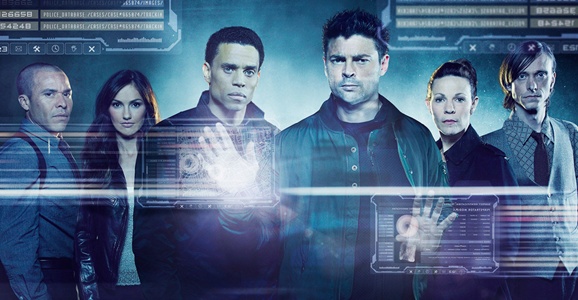J.J. Abrams On His Science Fiction Pet Peeve (It Isn’t Lens Flares)
This article is more than 2 years old
 J.J. Abrams is one of the most powerful guys in Hollywood these day, having put Star Trek back in the pop culture conversation in a big way (whether you like how he did it or not) and now helming the first new Star Wars film since 2005’s Revenge of the Sith. On the TV front he’s executive produced one of the biggest genre shows ever (Lost) and one of the best in recent memory (Fringe), with another show with great potential premiering this weekend (Almost Human). There are plenty of fans who take great joy in criticizing Abrams’ style and storytelling choices, but what about the man himself? What gets under his skin? As it turns out, it’s anachronistic dialogue.
J.J. Abrams is one of the most powerful guys in Hollywood these day, having put Star Trek back in the pop culture conversation in a big way (whether you like how he did it or not) and now helming the first new Star Wars film since 2005’s Revenge of the Sith. On the TV front he’s executive produced one of the biggest genre shows ever (Lost) and one of the best in recent memory (Fringe), with another show with great potential premiering this weekend (Almost Human). There are plenty of fans who take great joy in criticizing Abrams’ style and storytelling choices, but what about the man himself? What gets under his skin? As it turns out, it’s anachronistic dialogue.
More specifically, he hates when shows set in the future make use of modern terms or phrases that almost certainly won’t exist — at least in the same form — in whatever setting you’re dealing with. Abrams tells Time:
Frankly, one of my biggest pet peeves is the use of certain phrases that I just can’t for the life of me believe will exist five decades from now. … Even little things. If you read a story about a hard drive, it’s like, There won’t be a hard drive! I’m not saying there won’t be a version of a memory cartridge or some obvious equivalent. If you’re telling a story about the future, we’re going to be bipeds, we’re going to be wearing clothes, we’ll live in structures, we’ll consume comestibles, we’ll inhale oxygen. They’re all things we know we’ll maintain. The truth is that almost every relationship — whether it’s between people or people and their work — there will always be these analogous situations you can get. The thing that drives me crazy is when it’s a literal connection to what exists now. When you think on a day-to-day basis how many little things we might say or refer to that if 30 years ago someone had said to you, “You know, I’ll text you in 10 minutes,” you’d be like, “What’d you say?” It would almost be like alien talk. You have to think in terms of practical dialogue. Producing a TV show or movie, there are just going to be certain phrases and terms that will be completely alien to us now, if we heard them from the future.
The man has a point. Ideally, your future evolutions of modern-day ideas, phrases, and technologies should blend into the show and not necessarily draw that much attention to them. As far as I recall, Star Trek never explained the notion of a tricorder — it just showed McCoy scanning people with it and audience members understood, “Okay, it’s like an x-ray or CAT scan.” Having little details of how your future world is different from our era, and working those details into the story in an organic and subtle way, helps add a sense of verisimilitude to the story being told.
It’s a double-edged sword, though. If you’re just creating future versions of things that will likely still exist in more or less their current form, it can get distracting or even annoying. Having Romulan ale is fine. But we don’t really need to find out that the rest of the bar’s menu includes Klingon gin, Vulcan bourbon, Andorian tequila, and Pakled Sex on the Beach. Especially not Pakled Sex on the Beach. It’s the same with slipping modern pop culture references into a supposedly future setting as a way to wink at the audience. You might as well just start slapping expiration date stickers on the show.
There are exceptions, of course. Farscape had John Crichton dropping pop culture references constantly, but nobody else understood them, and that became the joke. Plus, Ben Browder is a charming motherfucker, so he could get away with it.
We’ll have to wait and see how well Abrams’ latest show handles the challenge of convincing future language when Almost Human premieres on Fox this Sunday, November 17 at 8/7c. If you’re going to be out, make sure to set it to record on your Betamax VCR.












